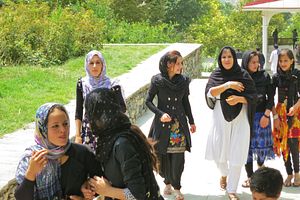At his inauguration ceremony in Kabul last September, Afghanistan’s President Ashraf Ghani, the victor of a bruising election campaign that summer, surprised many in the crowd by heaping praise on his wife, Rula. Ghani bragged that his first lady would wield far more influence than her predecessor, Zeenat Karzai, who rarely ventured beyond the security cordon in nearly a decade of living at the Presidential Palace. Ghani quickly put her husband’s promise to work, spearheading a campaign to improve living conditions for Afghanistan’s 750,000 internally displaced citizens.
Rula is just one symbol of the advances that Afghanistan’s women have made since Taliban rule ended 14 years ago. In 2015, women in Kabul are going to college, joining the army, and taking boxing lessons. Before taking office, Ghani and Abdullah Abdullah, Afghanistan’s chief executive, signed petitions endorsed by activist groups that committed to appoint four women to cabinet positions, a quarter of the posts, and to make the Afghan civil service 30 percent female. Many Afghan women were ecstatic. The moves gave substance to their hope for more changes in education, living, and working conditions.
That hope appears to be on hold. When Ghani released his cabinet picks in January, the list contained just three women. Acclaimed journalist Najiba Ayubi, chosen to lead the ministry of women’s affairs, was struck from the final list. Two other female nominees, Ai Sultan Khairi and Khatera Afghan, barely saw the light of day: Khairi was dismissed on charges that she had forged her identification and parliament quickly terminated Afghan’s nod.
Dozens of demonstrators marched in the streets of Kabul after Ghani announced the nominations. Women’s activist groups fear the nominations were a sham. They’ve delivered a new list of female candidates to Ghani and Abdullah, demanding the new administration reconstitute 38 percent of the proposed cabinet with female candidates. That figure is particularly resonant with activists, since it matches women’s turnout in Afghanistan’s pivotal presidential election last spring.
Khairi, Afghan, and Ayubi’s nominations weren’t the only bids for the cabinet to meet an early end. Parliament rejected 10 of the 25 candidates on Ghani’s initial list.
Still, despite their inability to easily access high political offices, Afghanistan’s women enjoy much higher standards of living than they used to. The controversy over Ghani’s nominations never would have occurred ten, or even five years ago. Ghani should hold up his end of the bargain to activists and make the appointments, as promised. But many of the factors that hold back women in Afghanistan are cannot be easily legislated – or appointed – away.

































